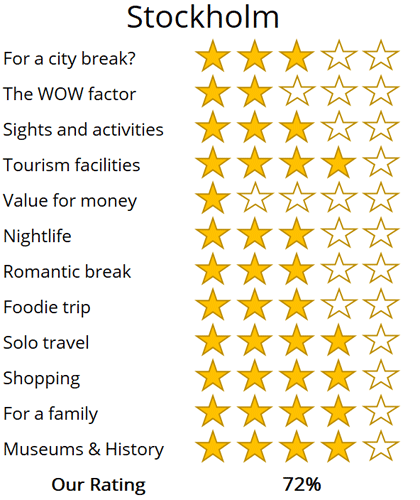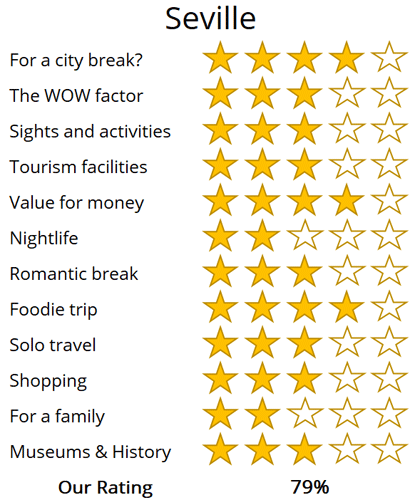WhereToGoForMyHoliday.com
The best destination comparison site!
WhereToGoForMyHoliday.com
The best destination comparison site!
Stockholm or Seville, which is better for your holiday in 2024?
Seville and Stockholm both offer unique and enticing experiences, but which one should you choose for your city break or holiday?
We understand your dilemma. There is an abundance of travel guides for both cities, but few actually comparing them, and advising you which is the better for your trip.
This article will provide our unbiased and independent views of Seville and Stockholm, hopefully making your choice that little easier.
The article is structured into several sections, each of which can be directly accessed through the following links:
• Introduction to the cities
• Scores and ratings
• Which one should I, friends, or family visit?
• When to visit and weather
• Who is the city suited for?
• The perfect 48hours (with map)
• Tourism details (where to stay? airport details?)
Introduction to Stockholm and Seville
Seville as a destination reflects that of the city’s famous dance, the flamenco; it is hot, passionate and instantly captivating. Seville boasts exceptional tourist attractions , and it’s rich cultural heritage will leave you longing for more.
Modern Seville is the interplay of its turbulent past, blending together Moorish roots and Christian influence in a city which wants to enjoy and embrace the present. Seville’s heritage is proudly displayed throughout the city, from the magnificent Alcázar palace, to the towering cathedral, mouth-watering tapas restaurants and impromptu flamenco dances.
Strangely, Seville typically lacks the appeal to the younger generation of tourists, but chance a trip and fall in love with the flare of southern Spain.
Magical, mystical Stockholm spreads over a speckling of islets surrounded by the icy Baltic Sea. At its centre is the fairy-tale Gamla Stan. Cobbled lanes wiggle and writhe around medieval rowhouses in those parts, opening onto a kitschy plaza filled with gingerbread cafés and grand Neo-Classical palaces.
Next door is happening Södermalm, a lived-in quarter with hipster meatball dives and ethnic eateries. Then there are Norrmalm and Östermalm, where amazing museums meet shopping strips and food halls.
Reputation has it that Stockholm isn't cheap. And it's true, this Scandi capital will set you back a bunch. But try not to let that put you off. There are rewards for loosening the purse strings, from days of fika (cosy coffee breaks) to encounters with ABBA the band to experiencing the buzz of a city that's at once modern and historic.

Stockholm lies on an Archipelago of islands between Lake Mälaren and the Baltic Sea

The Torre del Oro once guarded the Guadalquivir river and Seville
Seville vs Stockholm: City Ratings
Summary
Where would I journey for a personal escape?
Seville
Where would I send my parents for a memorable visit?
Seville
Where's the ideal destination for my adventurous 19-year-old cousin?
Seville
Where should my food-obsessed friend indulge their culinary passions?
Seville
Note: The above comparisons are weather-independent and are based on travel during the most opportune times of the year. Details about the ideal travel seasons are elaborated upon later in this article.
In the sections that follow, you'll find a comprehensive comparison between these two fascinating cities. This includes recommendations on the duration of stay, the best times to visit, and tailored 48-hour itineraries for each city.
The final segment delves into practicalities for your travels, such as the best airport to fly into, the optimal districts for your accommodation, and insider tips, for when you come to explore the city.
We hope that you find all of this information useful, in planning your next exciting trip!
Destination details
How long to spend each city?
Stockholm is a perfect city break spot. Two or three days is a great amount of time to while away between the historic Gamla Stan and the museums of Östermalm. What's more, planning a fly-in, fly-out jaunt has never been easier. There are no fewer than four airports serving the town, from big Stockholm-Arlanda to low-cost favourite Skavsta Airport. The advantage? It should be a cinch to find affordable connections in and out, say 72 hours apart.
If you've got a little more time to spare, then use it. Stockholm has secrets that aren't on the main tourist menu. For example, you could venture out to the rugged islands of the outer Stockholm Archipelago. They're for sailing, swimming, fishing, and wandering quaint villages. There are also the Viking relics of Birka and the idyllic forests and lake lands of Bornsjön. All those will require more than just a weekend.
Seville calls for a more unhurried exploration to truly soak in its relaxed pace and tapas culture. Two days in Seville allow for a comprehensive sightseeing experience, though a single, brisk day could cover the essentials.
Be mindful of the extreme summer heat, necessitating an earlier start to your day and a slower pace.
For those looking to venture beyond, day trips to historic Cordoba, the coastal city of Cadiz, or the dramatic Pueblos Blancos are worthwhile, though the latter may require a rental car or guided tour due to limited public transport options.
Insight: While Granada is a captivating destination, it is best experienced as part of a longer itinerary, perhaps alongside Seville and Málaga, for a fulfilling week-long holiday.

The waterfront of the Sodermalm district in Stockholm
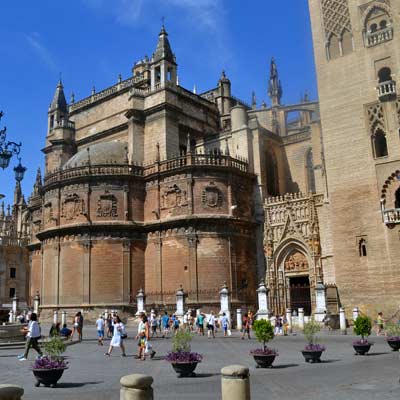
The Gothic Catedral de Sevilla
Wrap up warm if you're heading north in the winter months. Stockholm is a cold capital, but it comes with hefty sides of festive charm. At Christmas, you'll find lovely markets on Stortorget square in the middle of the Gamla Stan, the scents of mulled wine and hot chocolate floating up through the pastel-painted guild mansions. On the flip side, November to March also means uber-short days (think sunset as early as 3pm!) and lots of rain and snowfall.
If you prefer a dose of Vitamin D, consider the white nights of summer. It doesn't get dark until well into the evening between June and August. What's more, the weather is usually warm and mild, with daily averages in the low 20s. Of course, this is also the most popular time to come, so expect hotel rates to be inflated.
The best time of year to visit Seville is during the two festival periods of Semana Santa (held in the week before Easter) and the Feria de Abril (starting two weeks after Easter).
For a regular trip, late autumn and early spring are the best seasons, as during the long summer (June-September) the city is oppressively hot. Winter provides good value and fewer tourists but there is always the potential of rain.
Seville is a pleasure to visit, so long as you can either handle (or avoid) the extreme heat. This is a city for a slower paced trip, to enjoy time in the open-air cafes and to embrace the culture of Andalusia. This makes the city ideal for a break from a stressful lifestyle or hectic work schedule back at home.
The ambience typically appeals to a slightly older visitor, but to assume Seville is a mature destination would be completely wrong. There are exciting tourist attractions, a colourful nightlife and a social atmosphere. One of the appeals of Seville is that it is not a common city break and few of your friends will have been there.
If you're a fan of culture-brimming capitals and enchanting old towns, then Stockholm is sure to impress. Whole days of wandering between waterside parks, centuries-old terraces, cobbled squares and stooped taverns are on the menu. And so are visits to places like the Vasa Museum, with its 17th-century Swedish warship pulled up from the deep.
In addition to all that, districts like Södermalm are there to entertain the foodie and the art lover. It's a vibrant mix of multicultural cafés and restaurants. On one corner you'll see a Bahian curry stall, on the next you'll catch a Lebanese rice kitchen. And that's not even mentioning the wealth of fair-trade coffee shops and roasteries that make an appearance.
It's also quite pricy, so we'd recommend anyone on a budget to steer well clear.

The Royal palace in Stockholm

The Plaza de España is always a highlight of Seville
48hours in Stockholm
Let's get stuck into Stockholm with this curated 48-hour itinerary. It whisks you from the aged heart of the town to some of its lived-in outer areas, and passes acclaimed museums and eateries as it goes…
Day 1: Hop out at Gamla Stan station in the early morning. Doing that puts you right at the meeting point of the Free Walking Tour Stockholm. Their trips typically take around two hours from start to finish, but they're a fine intro to all the secrets and monuments of the amazing district.
You'll probably encounter the bustling shopping thoroughfare of Stora Nygatan, the narrow alley of Prästgatan, and the handsome Stortorget square, all topped off with the stunning Royal Palace of Stockholm to learn about the boundary-breaking monarchy of Sweden. Once it's finished, be sure to stroll down cobbled Österlånggatan between the toyshops and Nordic taverns.
Have something to eat there and then move south across the water to Södermalm. One of the first things you'll encounter is the Katarina Elevator, with its high lookout points gazing across the old town. A few blocks to the south and you'll be in SoFo. This is the hipster hub of the city. If you can get a place, be sure to dine at quirky Meatballs for the People – expect modern twists on Scandi staples. If not, there are oodles of ramen places and Indian joints to boot.

Stockholm 5
Day 2: Breakfast at the Hötorgshallen. A colossal, two-floor food court, it's bursting with pretzels, smoked-salmon outlets, New Yorker delis, and more. It's also on the edge of Norrmalm's chic shopping area. Wander that to see designer outlets galore before emerging onto the salt-washed quays around Berzelii Park.
From there, you'll be able to see the forested island of Djurgården – your next destination. It's a short walk, with a few riverside cafes like the Sjöcafeet to enjoy en route. Then you delve straight into the Vasa Museum. Simply not to be missed, it's a chart-topper of Stockholm. The whole exhibit revolves around a mighty warship that sunk in Stockholm harbour just minutes after launching in the 17th century.
If time allows, ABBA the Museum is also next door, complete with glitzy pop paraphernalia and the piano on which some of the band's hit tracks were written. Behind all that is the vast open-air museum come park of Skansen. It's got living history that'll transport you back to medieval Sweden, along with a fun funicular train ride and even enclosures with brown bears.

The colourful house on the Stortorget, the main Square of Stockholm
Below is an interactive map for 48 hours in Seville; day 1 is highlighted in green and day 2 in yellow, with optional sights in grey.
Start the day in the impressive Catedral de Sevilla, and climb to the top of La Giralda bell tower for a wonderful viewpoint. Surrounding the cathedral is the atmospheric Santa Cruz district, with its traditional houses and narrow cobblestone streets, which follow the old medieval layout of the city.
For the afternoon, visit the grand Plaza de España and the adjoining Parque de Maria Luisa. Towards the end of the day join a cruise along the Guadalquivir River. For dinner, head to the Triana district for an authentic Tapas meal. This district is also where flamenco dancing originated, and one of the bars may well have some impromptu dancing happening during the evening.

The gardens of the Real Alcázar palace
For the second day, start by visiting the Real Alcázar palace, the finest example of Mudéjar architecture which fuses Arabic and Christian designs. For the afternoon, head north of the historic centre and explore the popular shopping streets of Calle Sierpes. End the afternoon at the Setas De Sevilla, a massive wooden structure and great viewpoint.
In the evening, watch a flamenco performance at the La Carbonería.
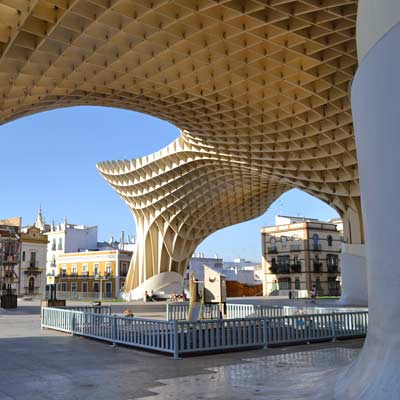
The Setas De Sevilla is the world’s largest wooden structure, but few know what it actually is or the point of it……
Seville airport (SVQ) is 10km northeast from the city centre, and is connected by a regular bus service (35min €4.00). Many of the low-cost airlines focus on the coastal cities of southern Spain instead of Seville, which means the cost of flights can be surprisingly high - plus there are fewer departures. This means that demand for flights can be very high in summer (when the city is best avoided).
This high level of tourism also means that hotels tend to be more expensive than much of Spain, and it’s likely you will spend much more than you anticipated! If you are lucky enough to visit during the two festivals, book your accommodation well in advance. Seville is compact and very easy to explore on foot.

The Maestranza bullring; bullfighting is an important tradition in Seville
Stockholm has four individual airports. Stockholm-Arlanda is the largest. That's where you're likely to land on long-haul connections. The direct Flygbussarna transfer can get you back and forth in just 45 minutes, but there's also express rail straight to the terminal.
Skavsta Airport is a hub for low-cost carriers like Ryanair and is linked to the city by private coach transfers (travel time: 1.2 hours). Bromma Airport is mainly for domestic links and also has buses straight to the city. Finally, there's Västerås Airport. Over 60 miles to the west, it's popular for Sweden-UK flights. A coach transfer there takes around 80 minutes in total.
If you're struggling on deciding where to stay in Stockholm, look no further than the northern quarters of Södermalm. That's a good balance between affordability, convenience, and proximity to the Gamla Stan. Of course, there are also hotels in the middle of the old town, but you'll usually need to fork out more for the immersion.
Related articles: Where to stay in Stockholm
By far the best way to navigate is on the Storstockholms Lokaltrafik network. The metro is very efficient and clean, running regularly from stop to stop. Get yourself a combined SL Travel Card that allows for unlimited travel for the duration of your trip. These cost around 240 SEK ($25) for three days but will certainly save you money in the long run.

The Royal crown of Sweden and the Royal Palace to the rear
Stockholm is one of the safest capital cities in Europe, though problems are not unheard of. There are still pickpockets and muggings but stay sensible and calm and they are very unlikely to affect your trip. The most common places to fall victim to these sorts of crimes are on the subway, in the Gamla Stan, and in busy food halls..
Never stand on the cycle lane in Stockholm. Getting around on two wheels is an important mode of commuting for many locals. They don't take kindly to folk who get in their way!
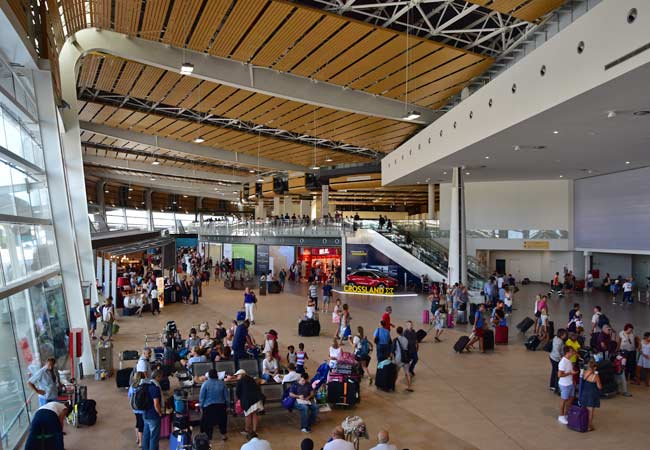
oh we were stuck in the airport!

Copenhagen was a bit expensive...

All we did was drink beer in Brussels...
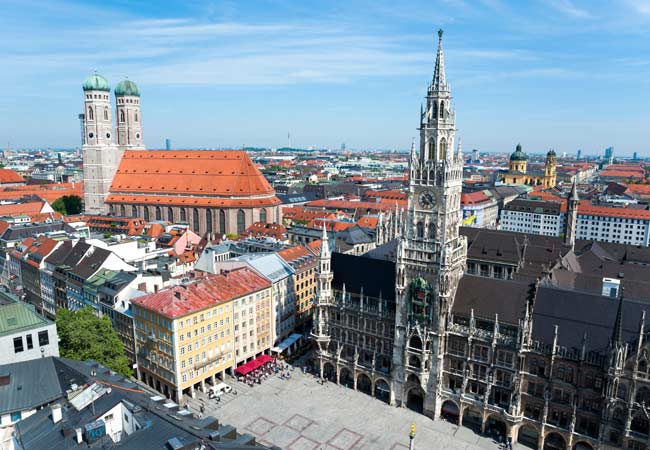
Muncih was crazy
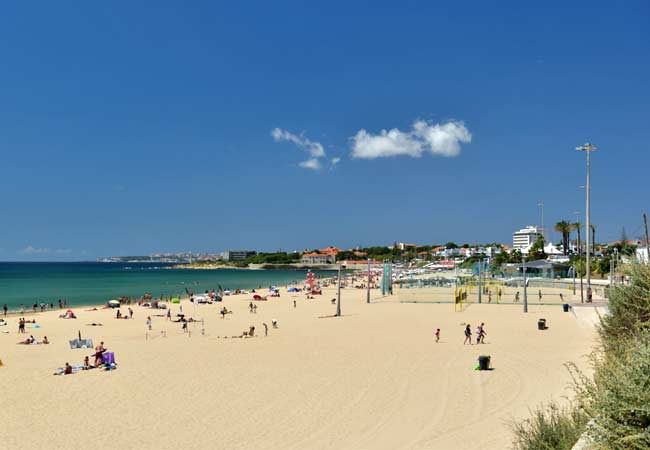
And we got so burnt!
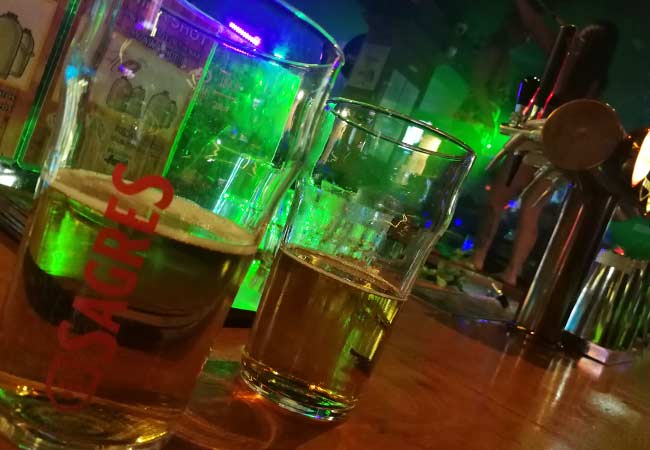
Remeber that night in Rome

oh we were stuck in the airport
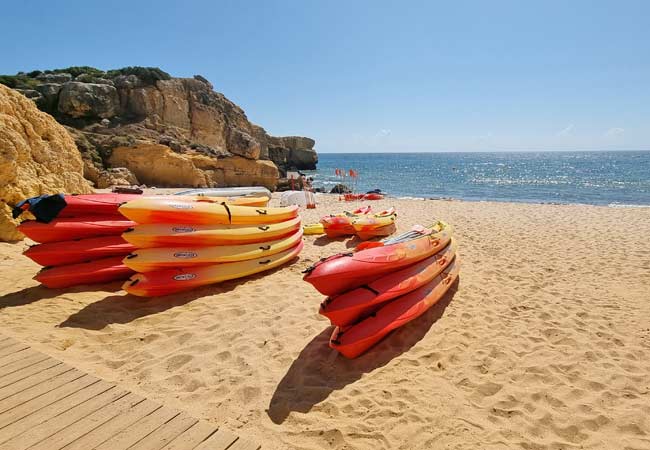
So much fun kayaking

Berlin and that group from Austria!

There was such a view from that church

And we got so burnt!

Munich was eventful, wasn't it!

Such a view from that cathedral in Florence
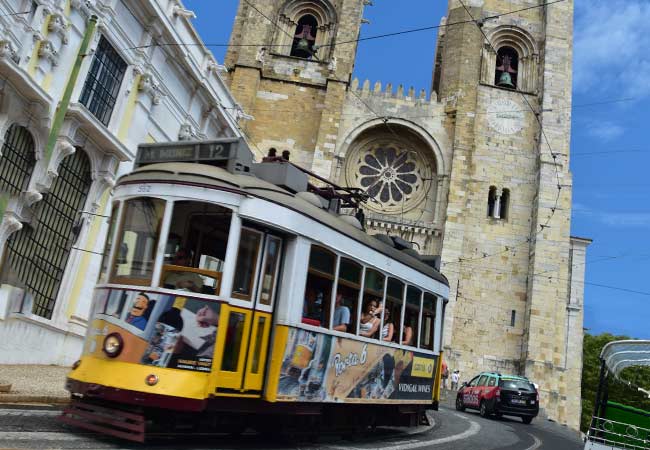
Lisbon was such so much fun

Last summer was so much fun .... x

Remeber that night in Rome

Lisbon was such so much fun

Such a view from that cathedral in Florence

Munich was eventful, wasn't it!

And we got so burnt!

Remeber that night in Rome

All we did was drink beer in Brussels...

Berlin and that group from Austria!

Can't wait to go back to Dubrovnik

Remember that boat ride in Prague

Copenhagen was a bit expensive...
